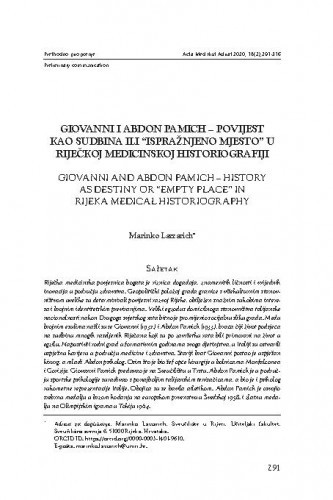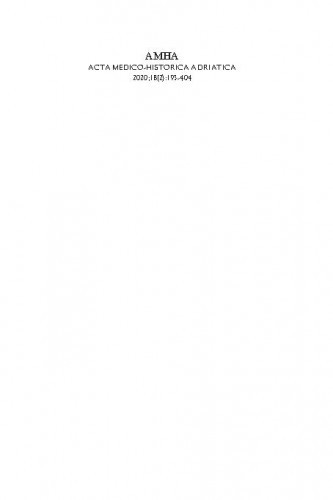Riječka medicinska povjesnica bogata je riznica događaja, znamenitih ličnosti i vrijednih inovacija u području zdravstva. Geopolitički položaj grada granice s višekulturnim stanovništvom uvelike su determinirali povijesni razvoj Rijeke, obilježen snažnim sukobima interesa i brojnim identitetskim previranjima. Veliki egzodus domicilnoga stanovništva talijanske nacionalnosti nakon Drugoga svjetskog rata bitno je promijenio socijalnu sliku grada. Među brojnim esulima našli su se Giovanni (1932.) i Abdon Pamich (1933.), braća čiji život podsjeća na sudbinu mnogih raseljenih Riječana koji su po završetku rata bili primorani na život u egzilu. Napustivši rodni grad u formativnim godinama svoga djetinjstva, u Italiji su ostvarili uspješnu karijeru u području medicine i zdravstva. Stariji brat Giovanni postao je uspješan kirurg, a mlađi Abdon psiholog. Osim što je bio šef opće kirurgije u bolnicama Monfalconea i Gorizije, Giovanni Pamich predavao je na Sveučilištu u Trstu. Abdon Pamich je u području sportske psihologije surađivao s ponajboljim talijanskim tenisačicama, a bio je i psiholog rukometne reprezentacije Italije. Obojica su se bavila atletikom. Abdon Pamich je osvojio srebrnu medalju u brzom hodanju na europskom prvenstvu u Švedskoj 1958. i zlatnu medalju na Olimpijskim igrama u Tokiju 1964. Osim postignuća dvojice braće na polju medicine, u ovom se radu problematizira i pozicija emigranta, koja dolazi do izražaja u knjizi Abdon Pamich, memorie di un marciatore (Pordenone, 2016.) Roberta Covaza, uzbudljivoj biografiji riječkoga esula. Istražuje se koncept tematizacije ograničenja razlike i iskustva migracije stanovnika Rijeke suočenih s egzistencijalnim pitanjem.; Medical history of the city of Rijeka is a rich treasure trove of events, celebrities and valuable innovations in the field of healthcare. The historical development of Rijeka was largely determined by her geopolitical position as a border town with a multicultural population, marked by strong conflicts of interest and numerous identity turmoil. The great exodus of the domicile population of Italian nationality after World War II has significantly changed the social picture of the city. Among many of such esuli (immigrants) were brothers Giovanni (b. 1932) and Abdon (b. 1933) Pamich, whose lives are reminiscent of the fate of many displaced people from Rijeka who were forced to live in exile after the war. After leaving their hometown during the formative years of their childhood, they had successful careers in Italy in the fields of medicine and healthcare. The older brother Giovanni became a successful surgeon and the younger Abdon a psychologist. Along with his positions as the head of general surgery at the Monfalcone and Gorizia Hospitals, Giovanni Pamich was teaching at the University of Trieste. Abdon Pamich collaborated with the best Italian tennis players in the field of sports psychology, and was a psychologist for the Italian handball team. They both practiced athletics, and Abdon Pamich won the silver medal in speed walking at the 1958 European Championships in Sweden and the gold medal at the 1964 Tokyo Olympics. In addition to emphasizing the achievements of the two brothers in the field of medicine, this paper also addresses the position of the migrant, which is highlighted in Robert Covaz’s book “Abdon Pamich, memorie di un marciatore (Rome, 2016), an exciting biography of an emigrant from Rijeka. The paper also explores the concept of thematizing the limits of differences and experiences of migration of Rijeka residents facing the existential issues.
Sažetak

 Acta medico-historica Adriatica : 18,2(2020) / glavni urednik, editor-in-chief Igor Eterović.
Acta medico-historica Adriatica : 18,2(2020) / glavni urednik, editor-in-chief Igor Eterović.